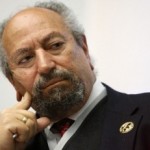The debate over Shari’a Friday protests has led many writers to deplore the extent of Islamic jurisprudence’s presence in the draft constitution. More than one writer has pointed fingers at the Muslim Brotherhood, accusing them of delaying the constitution writing as they are still unprepared for parliamentary elections. Other columnists have dedicated their pieces to scrutinising the ongoing clash between the Muslim brothers and the judicial authority, especially after the recent crisis of the prosecutor general.
Boiling the constitution, cooking the elections
Wael Qandil
Al-Shorouk newspaper
The Constituent Assembly’s delay in announcing the final draft of the constitution is mainly caused by Islamists, argues Qandil. Having a constitutional draft, ready for a public referendum, means that parliamentary elections will be the next step to prepare for. In the writer’s opinion, many Islamist political groups are hardly equipped to compete in the coming elections. Therefore, they are causing delays in that further put off the constitutional process.
Qandil backs up his argument by reference to the latest angry statement issued by a group of members in the body, who condemn the attempts to hinder the finalisation of the constitution’s preliminary version. The document chides certain figures in the assembly and accused them of serving for the benefit of the Muslim Brotherhood and their Freedom and Justice Party. Some Islamist members have also contributed to the ongoing disagreement around controversial articles in the draft rather than intensifying their efforts to suggest solutions.
Continuing in meaningless debates around the draft constitution indicates that a hide and seek game is being played by Islamists, who do not wish a near end to the constitution writing process. It could have been easier for all sides, Qandil says, if Islamists announced their unreadiness for yet another election marathon so soon, rather than pushing to delay the constitution further.
Al-Zind: the opposition’s leader
Emad Al-Din Hussein
Al-Shorouk newspaper
The Muslim Brotherhood would be facing difficult challenges if judges had executed threats to stop monitoring the Constituent Assembly’s mission, according to Hussein who analyses the shaky relations between the judiciary and the Brotherhood, particularly after the presidential decree to send prosecutor general Abdel Maguid Mahmoud to the Vatican. The columnist believes that both judges and Islamists have contributed to the tensions between the two groups.
In an atmosphere of weakened political opposition, Hussein views councillor Ahmed Al-Zind, head of the Judge’s Club, as the strongest opponent to the current regime. This was quite obvious following the dissolving of parliament and the attempted dismissal of Mahmoud from his post. In the prosecutor general’s conflict, Al-Zind made statements that mocked Morsy’s decisions to sack Tantawi and Anan, stating that judges cannot be treated in a similar manner.
In Hussein’s view, such statements led to the president’s apology to the armed forces and the dismissal of Al-Gomhuria’s editor-in-chief Gamal Abdel-Rahim from the newspaper. At the time when many senior members of the Muslim Brotherhood cannot forget the judicial decision to dissolve the parliament, many judges believe that the Islamists want revenge against the judiciary, which sent them to jail for years.
The Muslim Brotherhood’s promised heaven in the rubbish bin
Saad Al-Din Ibrahim
Al-Masry Al-Youm newspaper
Intensifying his criticism of the Muslim Brotherhood and salafis, Ibrahim believes that Islamist groups have misled the population with their preaching tone about Islam being the solution. Trying to convince Egyptians that the staunch grip of religion is the first step towards real development is the Islamists’ approach to gaining power. The writer censures the manipulative methodology through which the Muslim brotherhood has gained popularity.
He states that the earlier call for religion has been turned to a renaissance project, then diminised to meager achievements in the first 100 days of Morsy’s presidency. One of the main challenges that the president vowed to achieve is to eliminate the issue of hygiene in Egypt and places sets of garbage bins in all big cities. None of the heavenly promises has been met, according to Ibrahim.
Recalling the ‘Friday of Sharia’ protest called for by extremist Salafis and some Islamists, the writer disagrees with requests to implement Islamic jurisprudence. He states that issues like theft and adultery were not dealt with in a radical way during the life of Prophet Muhammad due to the difficulty of proving such offences in the first place.
So why do Salafis want to exaggerate punishments that relate to such issues? Probably that is the reason why the ruling party in Tunisia refrained from including clauses about the Islamic jurisprudence in their constitution. Trading in religion is a cheap way to gain power, states Ibrahim.
May Allah save our patriotism
Emad Al-Din Adeeb
Al-Watan newspaper
Adeeb adopts a light tone to jeer at common terms like “patriotic” and “Islamic”, which accompany the positions of many writers, analysts or even politicians in Egypt. The writer, who has lived for more than 10 years in western countries, says he has never heard how patriotic Oprah Whinfrey is when her charity work is discussed or how David Cameron is not nationalist enough to be Britain’s prime minister.
The exaggeration of using such terms scares Adeeb, who sarcastically says he is waiting to hear terms like “patriotic plumbers or carpenters”. The columnist has never observed in the United States a Republican competitor accusing his Democrat rival of being less patriotic. The same observation is relevant in Britian, France and Germany, where terms of patriotic and unpatriotic are hardly heard in the political realm.
Adeeb also condemns the widely spread use of the word “Islamic” in Egypt, especially after the rising tide of political Islam. Many writers and analysts are suddenly attached to the word “Islamic” even if their background is not strongly religious. What are the origins of using terms and why are people overusing them? In his perspective, referencing Islam or patriotism while referring to analysts or writers has undermined the precious values embedded in these concepts.
Flags of Egypt
Mohamed Salmawi
Al-Masry Al-Youm newspaper
Commenting on the increasing appearance of the green-coloured Upper Egypt flag, Salmawi expresses his opposition to changing the current Egyptian flag. Salmawy recounts how the pre-1952 green flag with its Islamic crescent and three stars representing Egypt, Sudan, and Darfur was replaced with the tricolour pattern by President Nasser following the Suez war of 1956. When Egypt and Syria were then united under the United Arab Republic between 1958 and 1961, two green stars were added to the flag, before a third star representing Yemen was then included.
With the dramatic shift in Egypt’s foreign policy introduced by President Sadat, the three stars were removed and replaced with the Quraishite eagle; a symbol Salmawi fails to comprehend. Nevertheless, Salmawi condones that Sadat’s flag has become a major source of pride for modern-day Egyptians, whose gathered en masse in Tahrir Square to wave the national flag in demand of bread, freedom, and social justice.
Salmawi is all for a flag that represents all Egyptians, irrespective of their regional or religious affiliation, and expresses his disdain for calls to establish regional and sectarian flags, whether in demonstrations or any other purpose. He cites the example of black “Qandahar” flags that have appeared numerous times in post-revolutionary demonstrations, condemning it as a lurking threat of separatism.






